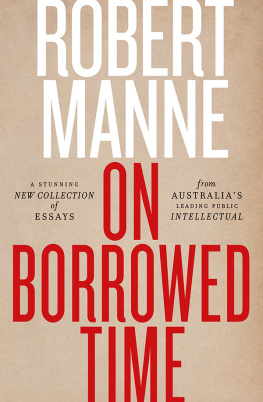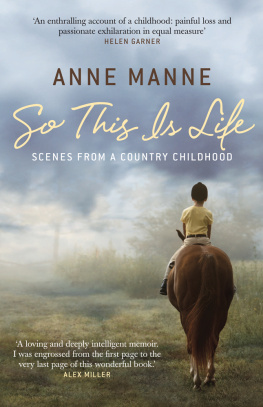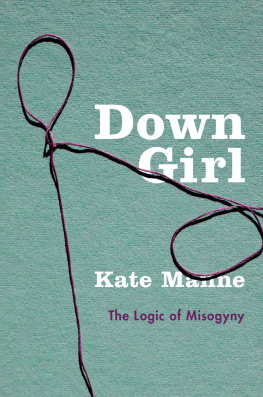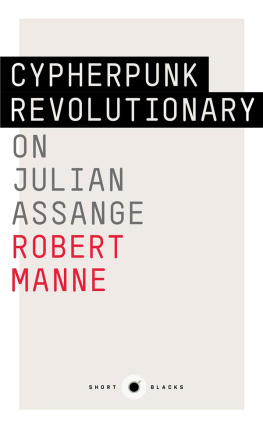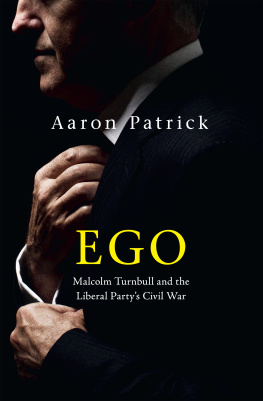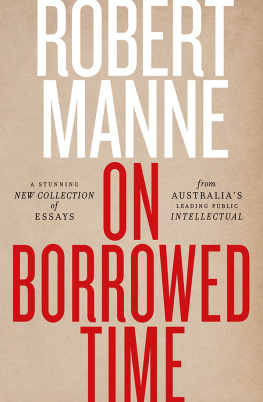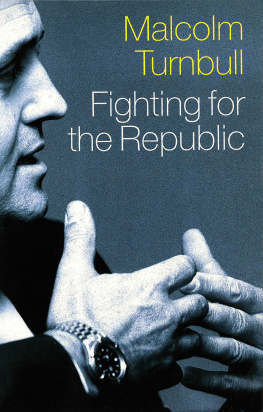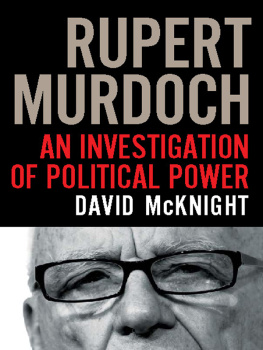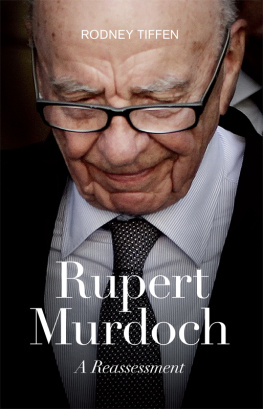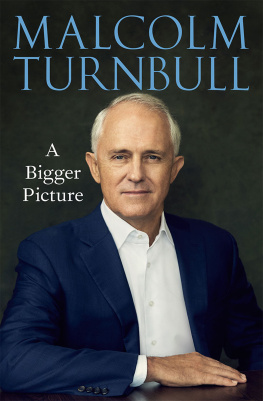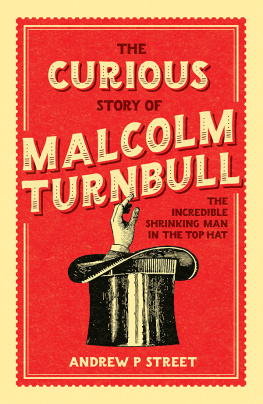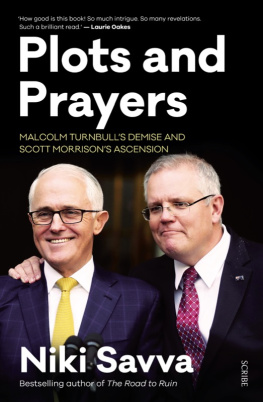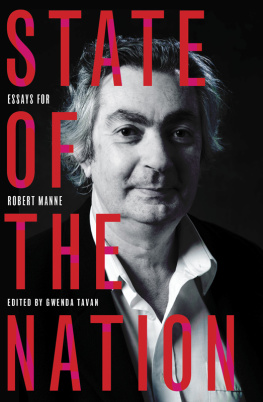PREVIOUS WORKS BY ROBERT MANNE
AS AUTHOR
The Petrov Affair: Politics and Espionage, 1987
Agent of Influence: The Life and Times of Wilfred Burchett, 1989
The Shadow of 1917: Cold War Conflict in Australia, 1994
The Culture of Forgetting: Helen Demidenko and the Holocaust, 1996
The Way We Live Now, 1998
In Denial: The Stolen Generations and the Right, 2001
The Barren Years: John Howard and Australian Political Culture, 2001
Sending Them Home: Refugees and the New Politics of Indifference (with David Corlett), 2004
Left, Right, Left: Political Essays 1977-2005, 2005
Making Trouble: Essays Against the New Australian Complacency, 2011
Bad News: Murdochs Australian and the Shaping of the Nation, 2011
Cypherpunk Revolutionary: On Julian Assange, 2015
The Mind of the Islamic State, 2016
AS EDITOR
The New Conservatism in Australia, 1987
Shutdown: The Failure of Economic Rationalism (with John Carroll), 1992
The Australian Century: Political Struggle in the Building of a Nation, 1999
Whitewash: On the Fabrication of Aboriginal History, 2003
The Howard Years, 2004
Do Not Disturb: Is the Media Failing Australia? 2005
Reflected Light: La Trobe Essays (with Peter Beilharz), 2006
Dear Mr Rudd: Ideas for a Better Australia, 2008
W.E.H. Stanner, The Dreaming and Other Essays, 2009
Goodbye to All That? On the Failure of Neo-Liberalism and the Urgency of Change (with David McKnight), 2010
The Words that Made Australia: How a Nation Came to Understand Itself (with Chris Feik), 2012
The Best Australian Essays 2013
The Best Australian Essays 2014

Published by Black Inc.,
an imprint of Schwartz Publishing Pty Ltd
Level 1, 221 Drummond Street
Carlton VIC 3053, Australia
www.blackincbooks.com
Copyright Robert Manne 2018
Robert Manne asserts his right to be known as the author of this work.
ALL RIGHTS RESERVED.
No part of this publication may be reproduced, stored in a retrieval system, or transmitted in any form by any means electronic, mechanical, photocopying, recording or otherwise without the prior consent of the publishers.
9781760640187 (paperback)
9781743820391 (ebook)

Cover design by Tristan Main
Text design and typesetting by Tristan Main
Author photo by Andrew Curtis
For Anne
daughters Kate and Lucy
son-in-law Daniel and nephew David
ON BORROWED TIME
In the early spring of 2016 I woke in the middle of the night, at a time when my defences were down, aware of a lump in my throat. When I was a child there had been an advertisement on television called The Seven Warning Signs of Cancer. One of the signs was described as a lump or thickening in the breast or elsewhere. The reference to elsewhere was rather alarming. Although I did not yet know it, the elsewhere had finally caught up with me. Whatever it was that was not right persisted. Eventually I consulted the GP I have been seeing regularly for the past twenty-five years or so. I mentioned my lingering sore throat. Should I perhaps return to the ear, nose and throat specialist who had diagnosed a cancer on a vocal cord eight years earlier? He thought that to be on the safe side I should.
Even though the reason for my regular rendezvous with the ENT specialist over the past years was far from ideal checking that the cancer had not made a return strange to say I had grown to be very fond of him, with his warmth, humour and no bullshit directness. Because of the combination of his kindness and his old-fashioned Anglo-Australian grammar school manner he always referred to my wife as Mrs Manne I thought of him as a Weary Dunlop type. (This turned out to be more accurate than I imagined. Every year, he travelled to the Kimberleys and the Northern Territory to examine scores of Indigenous patients and conduct simple operations. As I soon learned when we were discussing future appointments, like Weary he has a keen and practical interest in social justice despite his conservative demeanour.) The specialist now looked down my throat with the aid of an instrument that passes through the nose, and in a matter of seconds announced, Cancer, Im afraid.
Because of the previous cancer, I knew the ropes, or at least thought I did. A simple operation would remove some of the lump, in part so that an almost certainly unnecessary biopsy could be carried out. Then, so I imagined, Id be travelling down to the Epworth Hospital in Richmond five days a week for radiation treatment or, in the worst of cases, maybe also chemotherapy. I phoned my wife, Anne, to tell her the news. On the car trip home, my mood was one of defiance and (inexplicably) slight elation. On our verandah, looking onto the garden of the cottage where we have spent the past thirty-five years together, Anne and I calmly discussed the many implications.
On 26 October the small operation took place at the Austin Hospital in Heidelberg. The biopsy confirmed the bad news. Shortly after, I spoke on the phone to the radiation oncologist at the Austin who had advised us at the time of the previous cancer. It was then that I learned I didnt know the ropes. The oncologist thought that the larynx popularly known as the voice box, although it is considerably more than that would most likely have to be removed. Without even thinking I responded: Id rather die. From time to time Id seen a cheerful old codger in the local shopping centre speaking through the use of an electronic device placed against his throat. He sounded like a robot. This was what I thought might await me.
By now everything had become more intense. Before the biopsy, in Brisbane, where we were both speakers at a conference, I dined in a quiet restaurant with my friend of fifty years, Rai Gaita. A young woman approached us. She spoke almost with solemnity: What a beautiful friendship. How could she possibly know that? She told us she had been watching us for two hours. Around the time of the diagnosis, a book I had written on the ideology of the Islamic State was published. This meant that the news of the cancers return coincided with a number of public engagements, most of which had to be abandoned. I will never, however, forget one interview after the biopsy for a religious program on ABC Radio National which was not cancelled. I arrived at Southbank in torrential rain. To my complete surprise, the ABC building that I had visited scores of times looked like it had been bombed. It was, in fact, being entirely renovated. I ran in panic trying to find the new entrance. As the interview began, I was still panting. Andrew West, who had obviously read the book carefully, asked all the right questions. When we were finished I expressed my gratitude for his uncommon conscientiousness. I explained that this mattered to me more than usual as I was about to undergo a laryngectomy, and it would probably be the last interview I ever recorded. I was standing in a temporary tardis in Melbourne. He was in Sydney. Perhaps the combination of high praise and bad news overwhelmed Andrew. As we spoke, his voice broke.
Shortly after, Anne and I saw the Austin oncologist, a kind and sensitive man. We discussed alternatives to a laryngectomy, an unfamiliar word for me at that time. Radiation would most likely be useless, as my skin had previously been irradiated. Anne had read about so-called partial laryngectomies. The oncologist doubted this would be a possible treatment. My wife, who has dealt with horses for much of her life, has a far better understanding of physiology than me. She took in what I hardly heard. Without a laryngectomy, there was a strong possibility that within a matter of months I would be facing a very painful death. With delay now, the chance of performing a laryngectomy later might have passed. Nonetheless, despite all this, we left the appointment hanging onto the slender hope of some less radical treatment. The oncologist told us his colleagues would think that even considering anything other than a laryngectomy in my case was a serious mistake. He had, however, taken to heart my first words Id rather die.
Next page
